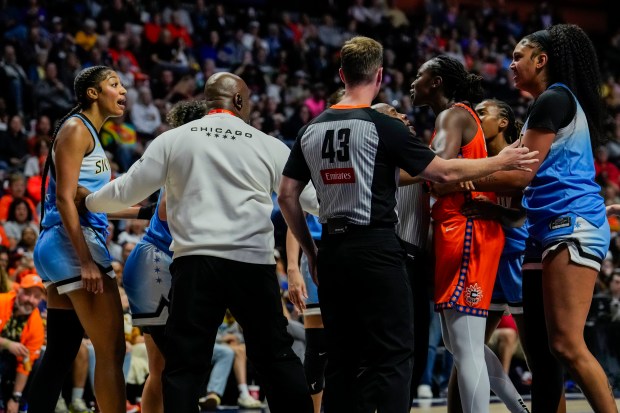The Illinois attorney general has launched an inquiry to probe “allegations involving serious governance issues” at the Cook County Health Foundation, requesting a raft of documents or correspondence dating back four years.
The request from the AG’s Charitable Trust Bureau earlier this month follows Tribune reporting last month about a potential conflict of interest and spending issues at the non-profit foundation while it was pursuing an expanded partnership with the county’s public health system. In the process, foundation leaders spent nearly $80,000, entered into contracts and hired attorneys with ties to one of the board’s leaders, at times without the rest of the board’s approval, according to a memo prepared for the board by the law firm Riley Safer Holmes & Cancila.
A spokesperson for Attorney General Kwame Raoul said the office does not comment on potential or pending investigations.
But in a letter dated April 29 and obtained by the Tribune, the bureau asked for governing documents dating back to January 1, 2020; copies of policies, statements and waivers from officers, directors and key employees related to conflicts of interest; a copy of the Riley Safer memo and an explanation of why the firm was hired.
The board’s executive director, Sylvia Zaldivar, did not respond to a Tribune request for comment. She denied impropriety in an interview last month and said the memo contained inaccuracies. Board Chair Joseph Flanagan declined an interview at the time, but said board members took “corporate governance matters very seriously.”
That partnership, a so-called “master services agreement” with Cook County Health, would have drastically changed the foundation’s current role from fundraiser to potential administrator of clinical trials or other direct programming involving the health system.
During negotiations, the memo said the board’s executive director contracted with vendors and law firms without proper board approval. One of those law firms, Kilpatrick Townsend & Stock, was paid $51,700 to negotiate with CCH, even though board secretary Gerald Haberkorn was, or was about to be, a partner at the firm.
The foundation also paid $27,800 to the Law Offices of Marc J. Lane for advice on the MSA even though the firm’s invoices “contained wholly inadequate descriptions of services provided by the firm,” and board members did not review or approve the hiring or payments.
In the January memo and a follow-up report in April obtained by the Tribune, Riley Safer said while Zaldivar produced a letter from Haberkorn to Flanagan disclosing his conflict of interest, they did not receive any documents laying out a full disclosure of the conflict to the board, an investigation of alternatives to avoid that conflict, or board action granting Haberkorn a waiver.
An updated report said foundation leadership also failed to provide documentation that justified payments for work to Marc J. Lane.
Bill Quinlan, an attorney, was one of the board members who originally requested that Riley Safer dig into the negotiations. Quinlan said he was concerned about a fast-moving shift in the foundation’s mission that he did not feel the board had been fully briefed on.
“We were taking on, conceptually, all this responsibility when we didn’t seem to have infrastructure in place and we hadn’t discussed it,” he said.
The findings of the Riley Safer report raised several red flags, Quinlan said, as did Zaldivar’s disagreement with its findings. He was unsurprised to see the AG’s letter.
The bureau’s job is to ensure donations to foundations are properly spent. It can request the foundation undertake specific changes to ensure compliance with the state’s charitable trust act, can enforce those changes in court, revoke the foundation’s charitable status, issue fines to the foundation or individual officers.
Quinlan said he and several other board members “are very concerned, they’re giving their reputations, their name, their efforts, and in many cases, their money, and they want to make sure it’s used in the best method, no one can claim we’re using money improperly.”
The probe has not touched Cook County Health, the public department that runs Stroger Hospital and other county medical facilities. “I am not aware of any requests made to CCH for information” from the Attorney General, spokeswoman Alexandra Normington said Friday.
Though Cook County Health dropped plans for an MSA last summer, it did grant the foundation $1.5 million to administer the Provident Scholarship Program, which awards up to $20,000 to healthcare students who are from, and dedicated to serving, underrepresented communities in Cook County.
Asked whether the probe changed its plans for the scholarship, Normington said CCH requires a report about who was awarded scholarships at the end of the program, “and our contracts provide CCH the ability to request audits. CCH staff are involved in the review and scoring of scholarship applicants using standardized criteria and evaluation matrix. We are confident that the allocated scholarship dollars will be awarded and disbursed appropriately.”
aquig@chicagotribune.com




